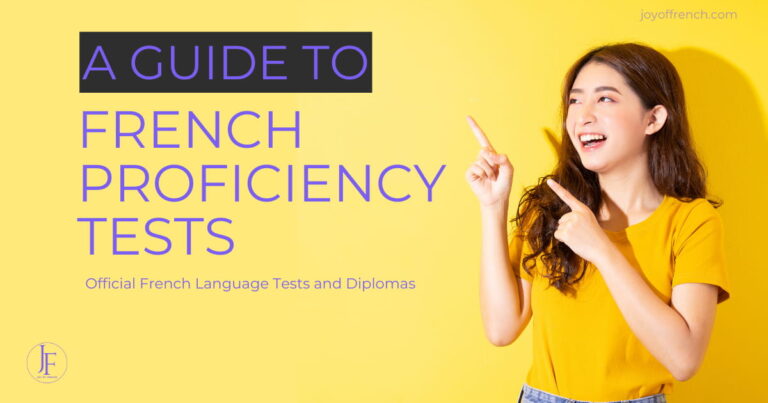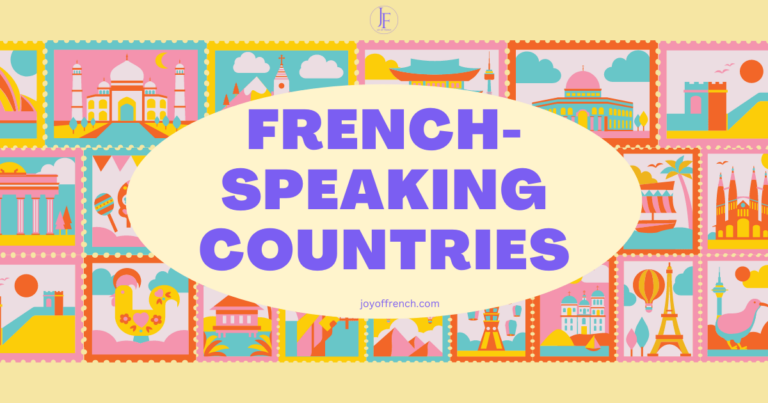You may have to take French language proficiency tests for many reasons. It can vary from university admissions to immigrating to France, Quebec, Canada, or any other Francophone country.
TEF and TCF are two French exams that are beneficial for many purposes. These tests can help you get additional points for permanent residency in France and Canada.
But what are TCF and TEF? What is the difference between these two French exams? Which is more suitable for your goal, and how to apply?
In this blog, I will cover the different variants. Also, the registration process, dates, exam centers, fees, test structure, format, results, eligibility, scores, validity, FAQ, and more.
Time to get started!
Table of Contents
Importance of TEF and TCF
French is a widely spoken, influential, and official language of over 25 countries.
The importance of the French language extends across domains. From personal to professional and cultural to academic, there are plenty of good reasons to learn French.
Today, immigration is another top motivation that attracts learners from far and wide. That is why many study French to boost their prospects of permanent residence in many developed nations.
Canada and France have become popular destinations for students and emigrants looking to start a new life and get a clear path to citizenship.
The Canadian government recently announced its immigration levels plan for 2024-2026. As per this plan, they are looking to invite 1.5 million new immigrants between 2024 and 2026.
Canada has two official languages: French and English. Almost the entire population speaks one or both.
To get permanent residency in Canada, you must apply through one of many immigration programs. For example, the Express Entry Program (EEP), Provincial Nominee Programs (PNPs), or Quebec Skilled Worker Program (QSWP).
The requirements and eligibility differ for these programs. Yet, language tests are often essential.
If you have a good command of French as a second language, you can get a CLB 7 in TEF or TCF. As a result, you can earn up to 50 extra points.
Besides IELTS and CELPIP English tests, the Canadian government accepts TCF Canada and TEF Canada. If you plan to move to Quebec, you have two more options: TCF for Quebec and TEF Quebec.
What is TEF (Test d’évaluation du Français)?

The TEF (Test d’évaluation de Français) is a standardized French language exam. It measures the French competence of non-native speakers.
The French Language Centre of the CCI (Chamber of Commerce and Industry) Paris Ile-de-France created the TEF test in 1998. The French Ministry of National Education has recognized this since 2004.
This test evaluates an individual’s reading, speaking, writing, listening, and understanding ability in French.
Recognitions and Acceptance
Many governments and bodies recognize and accept TEF. This includes the French Ministry of Education, Interior and Higher Education, Research and Innovation.
The Department of Immigration, Refugees and Citizenship of Canada and the Quebec Ministry of Immigration, Francisation and Integration accept. The Swiss State Secretariat for Migration also admits it.
Key Features of TEF
Let’s find out everything about the French TEF exam.
Sections
It comprises four main sections. Each assesses a different language skill.
- Compréhension Orale (Listening Comprehension)
- Compréhension Écrite (Reading Comprehension)
- Expression Orale (Speaking Expression)
- Expression Écrite (Writing Expression)
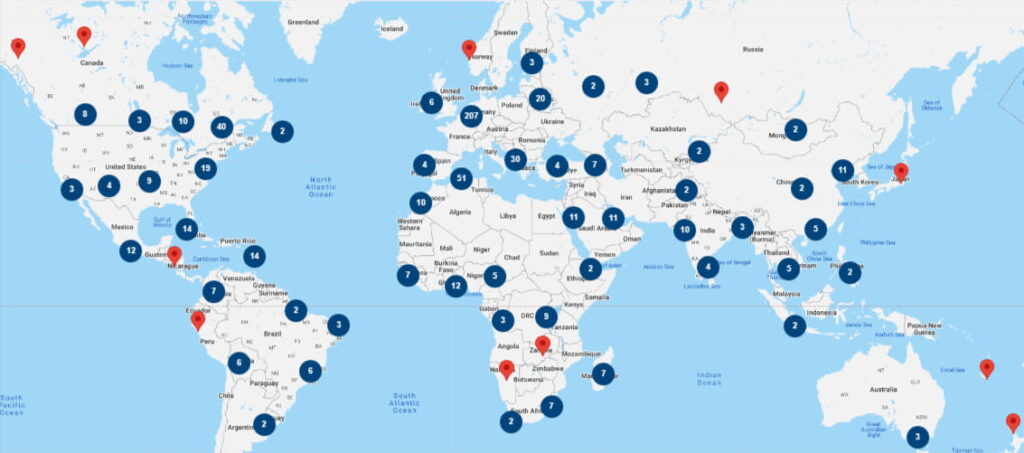
Levels
They structure the test into levels (A1 to C2). It follows the guidelines of the Common European Framework of Reference for Languages (CEFR).
Each level aligns with a specific aptitude level. The A1 is the first and beginner level. The C2 is the advanced, near-native level.
Scoring
You score each section of the TEF separately. Then, you get an overall result as a sum of the individual scores. The scores are then mapped to the CEFR levels.
Purpose
The TEF is useful for various goals. For instance, career opportunities involving French and higher studies in French-speaking nations.
The Canadian and French governments accept TEF scores. Thus, it is valuable for immigration to Canada and France.
The TEF results contribute to the Comprehensive Ranking System (CRS) points for the Express Entry immigration system. It helps if you apply via the Federal Skilled Worker Program and other immigration streams.
To apply for French nationality, you can appear for TCF or TEF IRN.
Validity
The results are valid for two years from the test.
Test Format
- Compréhension Orale (Listening Comprehension): Tasks involve listening to audio recordings. It has conversations, interviews, and lectures. Candidates answer questions based on the content.
- Compréhension Écrite (Reading Comprehension): Tasks involve reading and understanding written texts. E.g., articles, letters, reports, and answering questions based on the texts.
- Expression Orale (Speaking Expression): Tasks involve taking part in spoken interactions and expressing opinions. It also includes responding to prompts given by the examiner.
- Expression Écrite (Writing Expression): Tasks cover producing written texts. E.g., essays, letters, and summaries, to show writing skills.
TEF Test Versions
TEF has four different versions to meet different needs.
- TEF Other Purposes for study or work in France and Canada.
- TEF Canada for immigration to Canada.
- TEF IRN for French nationality and Residency Card.
- TEF for Québec Immigration.
Let’s dive into the individual test.

1. Test d’Evaluation de Français (TEF Other Purposes)
TEF for Other Purposes is for international students applying to higher study abroad programs in France and Canada. It is also helpful for work, job hiring, training, and internships.
It certifies your level of French mastery and helps decide your eligibility for these programs.
The grade is based on a scale with 7 levels. It starts from level 0 (basic) to level 6 (advanced fluency). It links to CEFR levels (A1 to C2) and the 12 levels of the Canadian Language Benchmarks.
They send the certificate by email within 5 to 6 weeks after taking the test. You can take the test as many times as you like. But there is a one-month waiting period required between two consecutive tests.
The test comprises 5 modular tests. You can choose any or all of the 5 exams listed below per your goals and requirements. Remember that you have to complete this examination in a single session.
TEF Other Purposes exam structure
- Listening Comprehension: 40 min – 60 items
- Vocabulary & Structures: 30 min – 40 items
- Reading Comprehension: 60 min – 50 items
- Oral Expression: 15 min – 2 topics to complete
- Written Expression: 60 min – 2 topics to complete
2. TEF Canada
The TEF Canada is a general international benchmark exam evaluating your overall knowledge of French. It is for both non-native French speakers and the Francophone population.
This test is required for economic immigration programs that demand proof of language skills. TEF Canada is vital evidence of French language proficiency level to gain Canadian citizenship.
This test also follows the same CEFR approaches as TEF Other Purposes.
It is proof of language ability by Citizenship and Immigration Canada (CIC) for permanent residence and Canadian citizenship applications. You require at least level 7 (B2 of the CEFR) to get bonus points.
The Canadian government also takes it for Provincial Nominee Programs (PNPs), start-up visa programs, and self-employed workers.
TEF Canada exam structure
The test comprises four modules: listening, speaking, reading, and writing.
The e-TEF is an online version where you can take the reading, writing, and listening modules on a computer at the designated test center. The number of seats for e-TEF is limited because of infrastructure capacity.
- Written comprehension (Reading): 60 minutes — 50 questions (300 points)
- Written expression (Writing): 60 minutes — 2 topics (450 points)
- Oral comprehension (Listening): 40 minutes — 60 questions (360 points)
- Oral expression (Speaking): 15 minutes per candidate — 2 subjects (450 points)
For immigration to Canada, all the above 4 sections are necessary. The total duration is 2 hours and 55 minutes.
For Canadian citizenship, the below 2 sections are mandatory. It takes 55 minutes to cover both.
- Oral Expression (Speaking): (15 minutes per candidate) – 2 topics – 450 points
- Oral Comprehension (Listening): (40 minutes) – 60 questions – 360 points
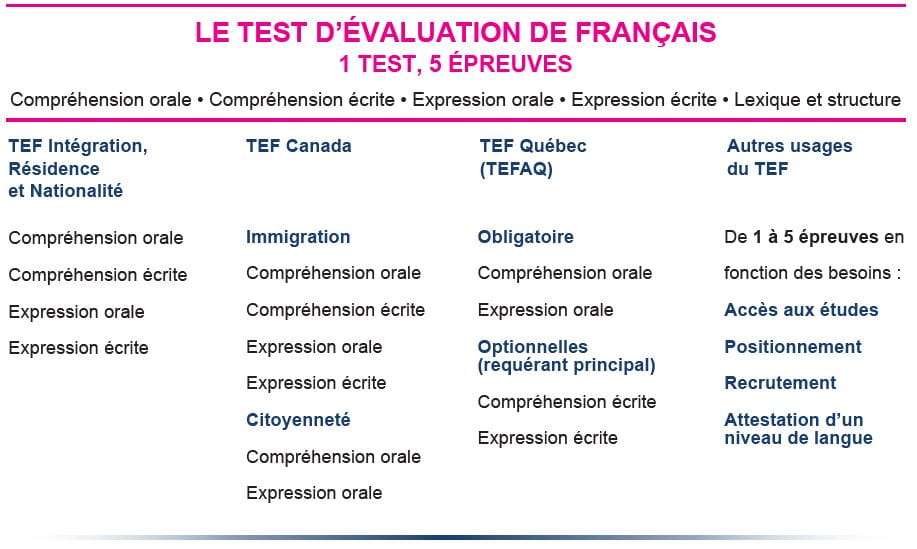
3. TEF Quebec (TEFAQ)
Do you want to immigrate to Québec under the Quebec Skilled Worker (QSW), Quebec Experience Program (PEQ), or one of many programs for business people?
Then, in that case, consider Test d’évaluation du Français adapté pour le Québec (TEFAQ) to increase your overall score.
It is specially designed to check your speaking and listening skills.
Quebec’s Ministry of Immigration, Diversity, and Inclusion (MIDI) admits the TEFAQ as part of an official immigration application.
TEFaQ exam structure
The TEF Quebec consists of four sections. It mainly focuses on verbal communication. The reading and writing portions are optional.
Two obligatory tests (55 minutes)
- Oral comprehension (Listening): 40 minutes — 40 questions
- Oral expression (Speaking): 15 minutes — 2 topics
Two optional tests (120 minutes)
- Written comprehension (Reading): 60 minutes — 40 questions
- Written expression (Written): 60 minutes — 2 topics
The total test duration is 2 hours and 55 minutes. To assess French, you need a minimum of B2 level. You get the results in electronic mode.
Completing the oral comprehension and expression modules can earn up to 14 points. You can get two more points by completing the elective reading and writing papers.
So, you can earn a maximum of 16 points. If your spouse also takes the speaking and listening sections, they can earn up to six points.
After taking the exam, Le “Français des Affaires” will email you a secure link to access your results and scores within 2-4 weeks.
4. TEF IRN (Intégration, Résidence, & Nationalité)
The French Ministry for the Interior acknowledges TEF Integration, Residence, and Nationality. It is necessary for individuals who wish to apply for a resident card or naturalization in France.
It evaluates oral/written comprehension and oral/written expression in French. It only measures language skills rather than understanding France’s history, culture, and society.
You need at least A1 in all 4 sections to validate the citizen course, A2 for the resident card application, and B1 for the nationality application.
TEF IRN exam structure
The TEF IRN has four mandatory exams. It has written comprehension, oral comprehension, written expression, and oral expression.
- Listening comprehension: computer-based group test – 20 MCQ – 15 minutes
- Reading comprehension: computer-based group test – 20 MCQs – 20 minutes
- Written expression: computer-based group test – 3 exercises – 30 minutes
- Oral expression: face-to-face with an examiner – 2 exercises – 10 minutes
The TEF IRN total test duration is 1 hour and 15 minutes. It checks your French level up to B1 on CEFR. They sent the results in a digital format within about 2 to 4 weeks.
What is TCF (Test de Connaissance du Français)
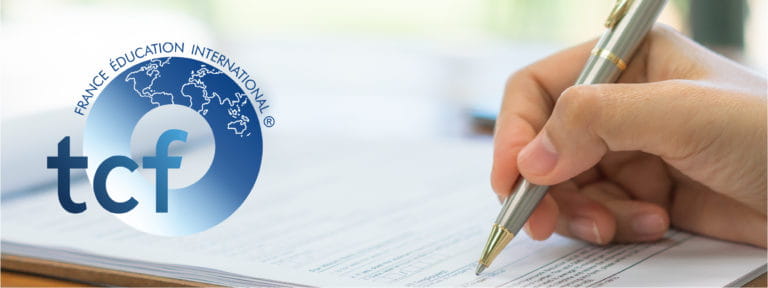
The Test de Connaissance du Français (TCF) is another French language placement test for non-native speakers of French.
The Centre international d’études pédagogiques (CIEP) of the French Ministry of Education manages the TCF. The French Ministry of Education has accredited it.
Like TEF, it is widely recognized and accepted for various purposes like jobs, academic admissions, and immigration.
Anyone aged 16 and above can take TCF Canada, regardless of nationality and mother tongue. The test certifies your French language for various reasons. For example, immigration to Canada, Quebec, and France.
The validity, scoring, test structure, benefits, and exam format are similar to TEF.
TCF Test Versions
TCF has four different versions to meet different needs.
- TCF Tout Public (TP)
- TCF IRN (Intégration, Résidence et Nationalité)
- TCF Canada
- TCF Québec Immigration (TEFAQ)
Let’s dive into the individual test.
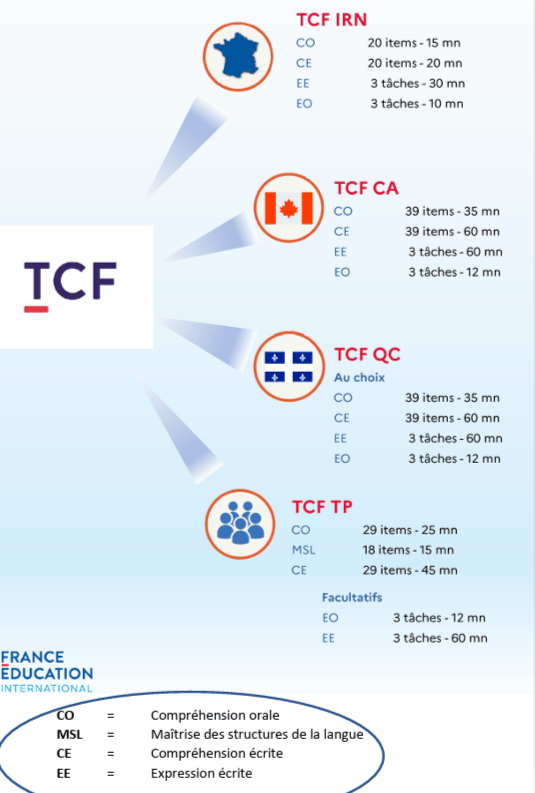
1. Le TCF tout public (TCF TP)
The TCF Tout Public (TP) is for general purposes and is suitable for various individuals and contexts. The certification helps for personal, educational, and professional reasons.
It measures the French skills of non-native speakers across many levels, from beginners to advanced learners.
Like other versions of the TCF, this has four main sections:
- Compréhension Orale (Listening Comprehension)
- Compréhension Écrite (Reading Comprehension)
- Expression Orale (Speaking Expression)
- Expression Écrite (Writing Expression)
TCF Tout Public test format
This version has three compulsory tests as multiple-choice questions (MCQs). There are two more optional tests. The candidate can decide whether to take it depending on their needs.
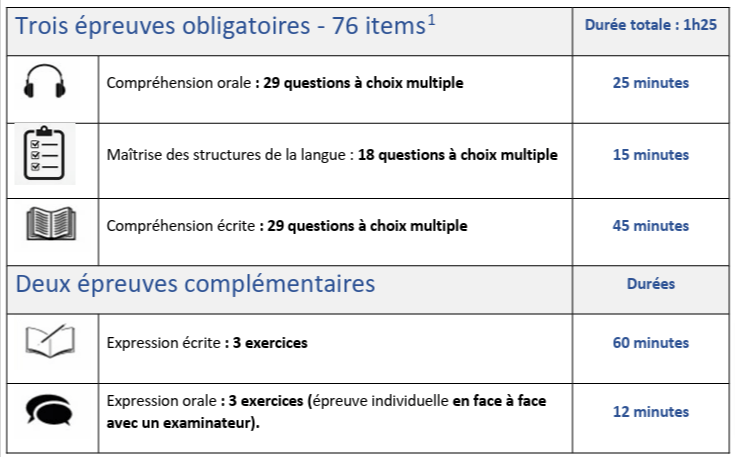
- Listening comprehension: Exam room test: 29 MCQ (25 minutes)
- Grammar comprehension: Exam room test: 18 MCQ (15 minutes)
- Reading comprehension: Exam room test: 29 MCQ (45 minutes)
- Written skills: Exam room test: 3 exercises (60 minutes)
- Verbal skills: Individual 1-to-1 with an examiner: 3 exercises (12 minutes)
The duration of the TCF Tout public depends on the number of tests. It can vary between 1 hour and 25 minutes to 2 hours and 37 minutes.
2. TCF IRN (Integration, Residence and Nationality)
The TCF IRN is aimed at all foreign nationals over 16 years old who aim to confirm their level of French.
It is helpful if you intend to apply for French nationality and a long-term residence permit. It can also validate the A1 level as a part of the OFII citizenship process.
TCF IRN test format
The TCF IRN comprises 4 mandatory tests that assess general French language skills. It assesses only linguistic skills and not familiarity with French history, customs, culture, and society.
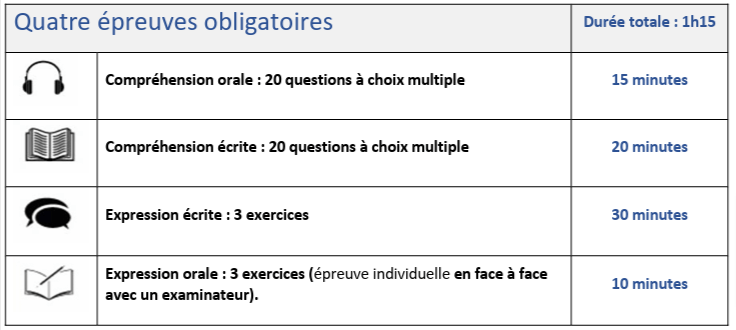
- Listening comprehension: Exam room test: 20 MCQ (15 minutes)
- Reading comprehension: Exam room test: 20 MCQ (20 minutes)
- Written skills: Exam room test: 3 exercises (30 minutes)
- Verbal skills: 1-to-1 with an examiner: 3 exercises (10 minutes)
The entire duration of the TCF IRN test is 75 minutes.
3. TCF Canada
Of five different variants, TCF Canada matches the criteria of Immigration, Refugees, and Citizenship Canada (IRCC).
They accept both TEF Canada and TCF Canada results for economic immigration or for gaining Canadian citizenship.
IRCC has accredited TCF Canada. The Ministry of Inclusion, Francization, and Immigration (MIFI) also accepts as part of an immigration application in the province of Québec starting May 1, 2022.
TCF Canada test format
TCF Canada exam comprises 78 items that cover listening and reading comprehension. All are multiple-choice questions, and candidates must pick one correct answer from 4 options.
It also has four mandatory sections: listening, reading, speaking, and writing. The TCF Canada lasts for a total of 2 hours and 47 minutes.
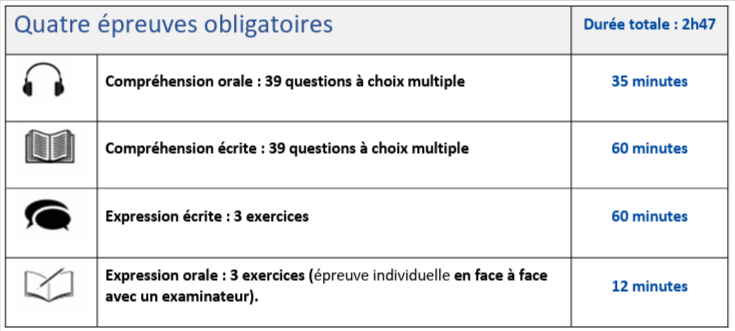
- Listening comprehension — (39 items — 35 minutes), All MCQs
- Reading comprehension (39 items — 60 minutes) — All MCQs
- Written expression (60 minutes — 3 Tasks)
- Oral expression (12 minutes — 3 Tasks)
4. TCF for Quebec (TCFQ)
TCF for Quebec is a French proficiency test approved by Quebec’s Ministry for Immigration, Diversity, and Inclusion (MIDI) standards.
After gaining the score, you can include the certification in the application. It is only valid for your immigration application.
The “TCF for Quebec” comprises two compulsory and two optional exams. It evaluates proficiency in the standard French language in writing, listening, reading, and speaking.
TCF for Quebec exam structure
TCFQ has only two compulsory modules — speaking and listening.
As a principal applicant, you can gain 14 out of 16 points by getting the maximum points in these two components.
- Listening comprehension (29 questions) — Duration: 25 minutes.
- Oral expression (speaking) (3 questions) — Duration: 12 minutes, including 2 minutes of preparation.
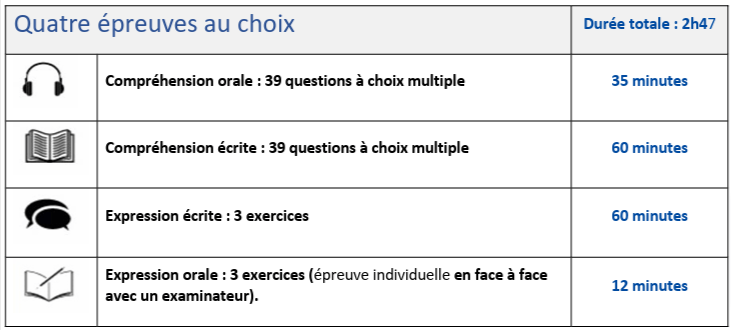
In the listening test, all questions would be MCQs with 4 choices and 1 correct answer. In speaking, it is an individual face-to-face test with an examiner.
You can earn two extra points by taking optional written (3 Tasks – 60 minutes) and reading (29 MCQs – 45 minutes) segments.
There are no limits on how many times you give TCF Québec. But you must wait 30 days between the two tests, regardless of the results.
Frequently Asked Questions about TCF and TEF

I have compiled a list of the most commonly asked questions about these French exams.
What is the validity period of TEF and TCF?
The validity period for all TEF and TCF results variants is two (2) years from the date of test result announcements.
How does TEF Canada differ from TCF Canada?
There’s not a lot of difference between these two. The difficulty level is the same for both, and the Canadian government accepts them equally.
The primary differences are the test format, number of questions, time limit, test centers, and fees.
Which is easier, TEF or TCF?
Both are almost the same in terms of language complexity. Having at least a DELF B2 level helps achieve the highest points.
Both exams are international and adhere to the official guidelines for the language. As an outcome, one should use standard French instead of the various French language varieties.
Are TEF Canada or TCF Canada difficult or easy to pass?
It’s easy if you already have a strong understanding of French from B1 to C2.
What if you have no prior knowledge or only studied it as an elective subject in school or college? It will take time to get ready for either test in that case.
Practicing random books or French language education apps alone won’t cut it.
Finding an experienced French teacher can improve your learning experience. You can join a French course offline or online at a reputable learning center.
What are the eligibility criteria?
Non-native French speakers aged 16 and older can take the TEF and TCF exams. Of course, you will also require a higher level of expertise in French.
What is the registration process?
Accredited centers conduct these examinations globally throughout the year. To sign up for any of these four tests, locate a nearby testing center and select a date.
Next, complete the form, choose the location, and pay the fee.
During registration, you might need to submit a photocopy of your official ID card (such as a driving license or passport), a photograph, and your signature. Plus, ensure you carry the same proof of ID to the test center.
Register as early as possible, as seats may fill quickly because of limited availability.
How much time is needed to get TCF and TEF Canada results?
Candidates can expect to receive an official certificate of results by mail. Usually, it takes 4 to 6 weeks after the exam. You’ll get a remark that’s detailed and personalized.
The document will display your scores for each module and level. It thoroughly explains your French competency.
What are the exam fees for the TEF and TCF Canada?
The TEF, TCF, TEFAQ, and TCFQ registration fees vary based on the test center and country.
For instance, it can vary from $300 to $400 in the USA. In India, the price ranges from ₹ 12,000 to ₹ 25,000, depending on the number of papers you intend to take.
After a successful registration, all fees are typically non-refundable. If the exam gets canceled, they will refund your money.
How many times can I take these tests?
There is no limit to the number of times you can take the test.
There are no restrictions. Yet, there must be a two-month interval between two consecutive exams.
How many extra points can you earn because of French?
To receive an extra 50 points, you must score CLB 7 / NCLC 7 or higher in all four French language skills (reading, writing, speaking, and listening). CLB 5 or higher on all four English skills is also essential.
Getting a CLB 4 or lower in English (or not taking an English test) and a CLB 7 in French in all four sections earns you an additional 25 points.
How long does it take to prepare for TEF or TCF?
There’s no definitive answer.
To earn 50 extra points for Canada and 16 points for Quebec, you must achieve a CLB7 or higher score. It’s equal to the upper tier of DELF B2. It takes beginners around 600 to 800 hours of study to reach this level. It would require almost two years.
The duration depends on how you learn languages.
A TEF French course from a language school or an experienced teacher can make the journey more favorable and quick.
Can I complete it within a timeframe of 3-6 months?
No. Exceptions are always there, but they aren’t examples. Putting in the effort, consistent practice, and proper guidance can lead to success within 12-18 months.
What is the best way to prepare for TCF and TEF Canada?
Finding a teacher or joining a nearby French language course online or offline would be better since exam preparation takes a long time.
Books, audio, and video lessons can also help improve your learning process.
How do TEF/TCF and DELF/DALF differ?
The fundamental distinction between these two exams is that the first is a single test. It shows your total points for French efficiency.
Select one of these levels: A1, A2, B1, B2 (DELF), and C1, C2 (DALF). Upon passing the test, you will receive the marks and diploma at that level.
The goal is another crucial difference.
DELF and DALF serve diverse purposes, including education in France and French-related jobs.
The Canadian and Quebec TCF and TEF tests are solely for those seeking immigration to Canada/Quebec.
DELF/DALF is valid for life, unlike TEF and TCF, which are only valid for two years.
Should I take the TCF or TEF if I already have a DELF or DALF certification?
Yes. For economic immigration applications and Canadian citizenship, the IRCC only recognizes TCF Canada and TEF Canada certifications.
Quebec provides two more choices. They are TEFAQ and TCFQ, apart from DELF, DALF, TEF, TCF, and TEF Canada.
Is it possible to pass or fail?
These exams are foolproof and have no pass or fail criteria. You discover your level and score on a scale from A1 to C2 without passing or failing.
The scores will decide your bonus points for Canada or Quebec.
What French proficiency level is needed for TEF?
You must reach level 7 of the NCLC (Canadian Language Benchmarks) to meet the minimum requirement. It’s the same as DELF B2.
Is online TEF available?
No. An e-TEF online version assesses your reading, listening, and writing skills through computer tests. Only authorized test centers allow you to appear for these exams.
When are the test dates for TCF and TEF Canada?
Unlike other language proficiency tests, TEF and TCF schedules differ. The registration and test dates are based on the testing centers.
Although they usually announce the dates early, that may only sometimes be true. It’s recommended to contact the nearest center.
Where are the TEF Canada and TCF Canada tests available?
CCI Paris Île-de-France, CIEP, L’Alliance Française, and other institutions collaborate to manage TEF and TCF tests. They conduct at approved test centers all year round.
To check the list of sanctioned examination centers, visit the official websites of CCI and CIEP.
Where can I take the TEF, TCF, TEFAQ, and TCFQ exams in India?
L’Alliance Française network assists in the TEF as well as TCF test in India. Contact the AF centers nearby to find out about upcoming dates.
Some known test centers in India are Bhopal, Bangalore, Chandigarh, Chennai, Kolkata, Mumbai, New Delhi, and Lucknow.
They keep changing the centers. So, get in touch with AF for the latest updates.
Here are the 2024 TEF and TCF testing centers in India.
→ TCF Canada — Kolkata, Bangalore, and Delhi.
→ TCF QUÉBEC – Bangalore and Kolkata.
→ TCF TOUT PUBLIC — Bhopal and Kolkata
→ TEF QUÉBEC — Bhopal, Chennai, Luckow, and Mumbai
→ TEF ANP — Kolkata
→ TEF Canada — Ahmedabad, Bhopal, Chandigarh, Chennai, Hyderabad, Lucknow, and Mumbai.
What happens if your score falls short of bonus points?
After a few months of preparation, you can try again. Whether or not you decide to make Canada your home, your French mastery can be valuable in various ways.
There are limitless options, including job options in Europe and North Africa and countless career paths!
Where can you find sample papers for the test?
Visit the official TEF and TCF websites to access various sample papers. Further, you have the option of using DELF B2-level books.
Do you plan to learn French to take one of these exams? If you have any questions about the TCF and TEF Canada and Quebec tests, let me know in the comments below.



